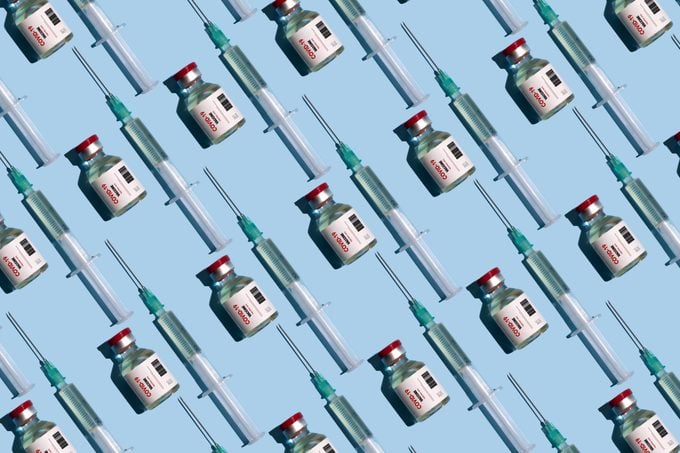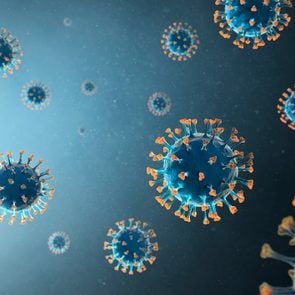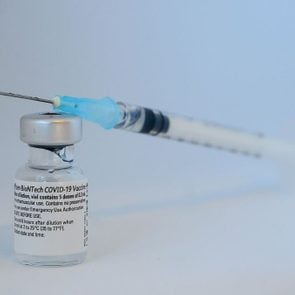Who Shouldn’t Get the Covid-19 Vaccine—and Why
Updated: Sep. 13, 2021
Covid-19 vaccines are easily available and recommended for just about everyone—but doctors say there are a few people who should talk to their doctor first. Here's what you need to know about who's a good candidate, and who isn't.
First, the people who should get the Covid-19 vaccine
Now that we finally have Covid-19 vaccines, nearly everyone should be vaccinated as soon as possible.
The more people who are vaccinated, the closer we are to achieving herd immunity—the point at which enough people in the community are vaccinated so that the small number of people who can’t get the shot for medical reasons still have protection because the virus won’t be able to spread as easily.
Reaching herd immunity is crucial because not everyone is a good candidate to receive the vaccine. Here’s how to know if you or a loved one is among that group.
Is the Covid-19 vaccine safe?
That’s a strong yes: The Moderna and Pfizer-BioNTech vaccines have enough safety data to satisfy the Food and Drug Administration (FDA) approval requirements.
Plus, they’ve passed through committees like the Advisory Committee on Immunization Practices, an expert group that advises the Centers for Disease Control and Prevention (CDC). (Find out what it’s like to participate in a Covid-19 vaccine trial.)
You may have heard some ludicrous Covid-19 vaccine conspiracy theories, but you can comfortably dismiss them.
Look at the data, not social media, advises Sharon Nachman, MD, the chief of the division of pediatric infectious diseases at Stony Brook Children’s Hospital.
The evidence for both safety and efficacy of the vaccine is reassuring, she explains. In fact, here are Covid-19 vaccine stories from people who got it and say it’s worth it.
People who are pregnant, breastfeeding, or trying to get pregnant should get the vaccine
Covid-19 vaccines don’t increase the risk of fertility problems or miscarriage. Research shows that the benefits of receiving a Covid-19 vaccine outweigh any known or potential risks of vaccination during pregnancy, the CDC says.
The CDC recommends vaccination for people 12 years and older, including people who are pregnant, breastfeeding, or are planning to become pregnant.
People who are pregnant or who have recently given birth are more likely to get severely ill with Covid-19 compared with people who are not pregnant.
“The American College of Osteopathic Obstetricians and Gynecologists issued a statement in December 2020 that pregnant women and lactating women should both get the vaccine,” Dr. Nachman says.
The Society of Maternal-Fetal Medicine also recommends taking the vaccine, according to board-certified immunologist Purvi Parikh, MD, with Allergy & Asthma Network, who is also a co-investigator on Covid-19 vaccine trials.
“The reason being is that pregnancy is a high-risk condition for severe Covid-19 and the risks of not taking vaccine are worse than potential side effects,” Dr. Parikh says. (Here’s what pregnancy is like during coronavirus.)
Getting vaccinated during pregnancy or when breastfeeding can also help protect newborns, who are too young to get vaccinated themselves, Dr. Nachman says.
“It will protect the pregnant woman, it does not cross the placenta, and the good news is that if those women make antibodies, the antibodies will cross the placenta and help protect the baby,” Dr. Nachman says. “And if they’re breastfeeding, it will also help protect their baby.”
Immunocompromised people should get a third vaccine
On August 13, the U.S. Food and Drug Administration authorized Covid-19 booster shots for certain immunocompromised individuals, saying a third shot could increase protection.
The FDA looked at information on the use of a third dose of the Pfizer-BioNTech or Moderna Vaccines in these people and found that administering a third vaccine dose helped increase protection in this population.
“[Immunocompromised people] may not make a good response to the vaccine,” Dr. Nachman says. People can be immunocompromised or have a weakened immune system for any number of reasons, such as treatment for cancer.
Other people need to take medication for health conditions, such as autoimmune disorders or an organ transplant, that can suppress the immune system. This makes it harder for vaccines to stimulate a strong, protective antibody response.
That means you may not get as much “bang for your buck” when you get vaccinated, Dr. Nachman says. “That’s not to say you shouldn’t take [the vaccine], you should take it, but you may not make as good a response as someone who’s not on those medicines,” she says.
That’s why the FDA authorized a third shot for this group of people. (Find out if you can drink alcohol before or after getting the Covid-19 vaccine.)

Talk to your doctor: If you’re allergic to any of the vaccine components
People should know that it’s very rare in general to react to the vaccine, especially if you have never reacted before, according to Dr. Parikh. “The stats overall for vaccine allergies are 1 in 1.3 million,” Dr. Parikh says. “You’re more likely to be hit by lightning.” (Here are the things allergists won’t tell you.)
That said, you shouldn’t get the vaccine if you have a true allergy to any of the components of the vaccine, according to Dr. Nachman.
The vaccine ingredients for the Moderna Covid-19 vaccine and the Pfizer-BioNTech Covid-19 vaccine are on the FDA website and on their corresponding company websites. “If one of those components is something you truly have an allergy to, you should not be taking the vaccine,” Dr. Nachman says. (Moderna vs. Pfizer: here’s what you should know.)
If you are allergic to any ingredients in the vaccine, avoid it until other alternatives are on the market, says Dr. Parikh.
A very tiny group—about 2 to 5 people per million who are vaccinated—have an anaphylactic or severe immune reaction to the vaccine.
If you have had a severe allergic reaction to other types of vaccinations, discuss the Covid-19 vaccine with your doctor first.
People with allergies unrelated to vaccines—such as pet or food allergies—can still get the vaccine. After receiving the vaccine, people are under observation for 15 minutes or double that amount if you have a history of severe allergic reactions, according to the CDC.
Talk to your doctor: If you currently have Covid-19
People who currently have Covid-19 should not get the vaccine until they recover. Instead, wait until after you meet the CDC criteria to discontinue isolation or quarantine.
If you are already sick, the vaccine is unlikely to help prevent serious problems, so don’t risk the health of other people by trying to get vaccinated if you are or may be infected. (Here are the coronavirus symptoms you should watch for.)
(Find out if you need the vaccine after having Covid-19.)
Talk to your doctor: If you received antibodies
If you received Covid-19 treatments such as monoclonal antibodies or convalescent plasma, wait 90 days before vaccination as a precaution to avoid any interference with immune responses, according to the CDC. (Here’s what you need to know about coronavirus antibody testing.)
Talk to your doctor: If you have a history of Bell’s palsy or Guillain–Barré syndrome
According to the CDC, there were cases of Bell’s palsy, or sudden weakness in the muscles on one half of the face, reported after vaccination in both the Pfizer-BioNTech and Moderna Covid-19 vaccines clinical trials.
That said, the FDA has not found that these cases were causally related to vaccination. “There is no relation to the vaccine itself as Bell’s palsy occurred at same incidence as in the general population,” Dr. Parikh says.
People can still experience or develop other medical problems during or at the same time as they get the vaccine or when they are doing the trials, she says. These medical problems that arise may not be necessarily due to the vaccine. And contracting Covid-19 and other viruses cause Bell’s palsy, so the risk may be higher not taking the vaccine, according to Dr. Parikh.
“Bells palsy is a very benign and a self-resolving condition in general and should not be a deterrent to obtain the vaccine,” she says.
Anyone with a history of Bell’s palsy can get a Covid-19 vaccine, unless they have a history of a severe or immediate allergic reaction to the components of the vaccine, according to the CDC.
Dr. Parikh adds that those with a history of a neurological disorder called Guillain-Barré syndrome (a condition in which the immune system attacks the nerves) may also want to consult their allergist or physician before proceeding with vaccination. (Can Covid-19 harm your brain?)
Talk to your doctor: If you are under a certain age
Children 12 years and older are able to get the Pfizer-BioNTech Covid-19 Vaccine, according to the CDC.
Experts say there may be enough research by late October 2021 for the FDA to authorize the Pfizer vaccine for children aged 5-11 years old.
Meanwhile, research on the Moderna vaccine in younger children is still ongoing before the company applies for FDA authorization.
(Learn how this new Covid-19 disease strikes children.)
Bottom line
The vaccine is considered safe for just about every adult. If you have a history of a severe or immediate allergic reaction to the vaccines’ ingredients, you should not take the vaccine or the second dose until there is an alternative.
People who currently have Covid-19 should wait for vaccination until after they are finished with quarantine and have recovered. Those who received Covid-19 antibodies should also wait for the vaccine for the best results.
As new research develops, these guidelines may change, but for the vast majority of people the benefits of vaccination outweigh any risks.
Next, check out the coronavirus myths you need to stop believing.



